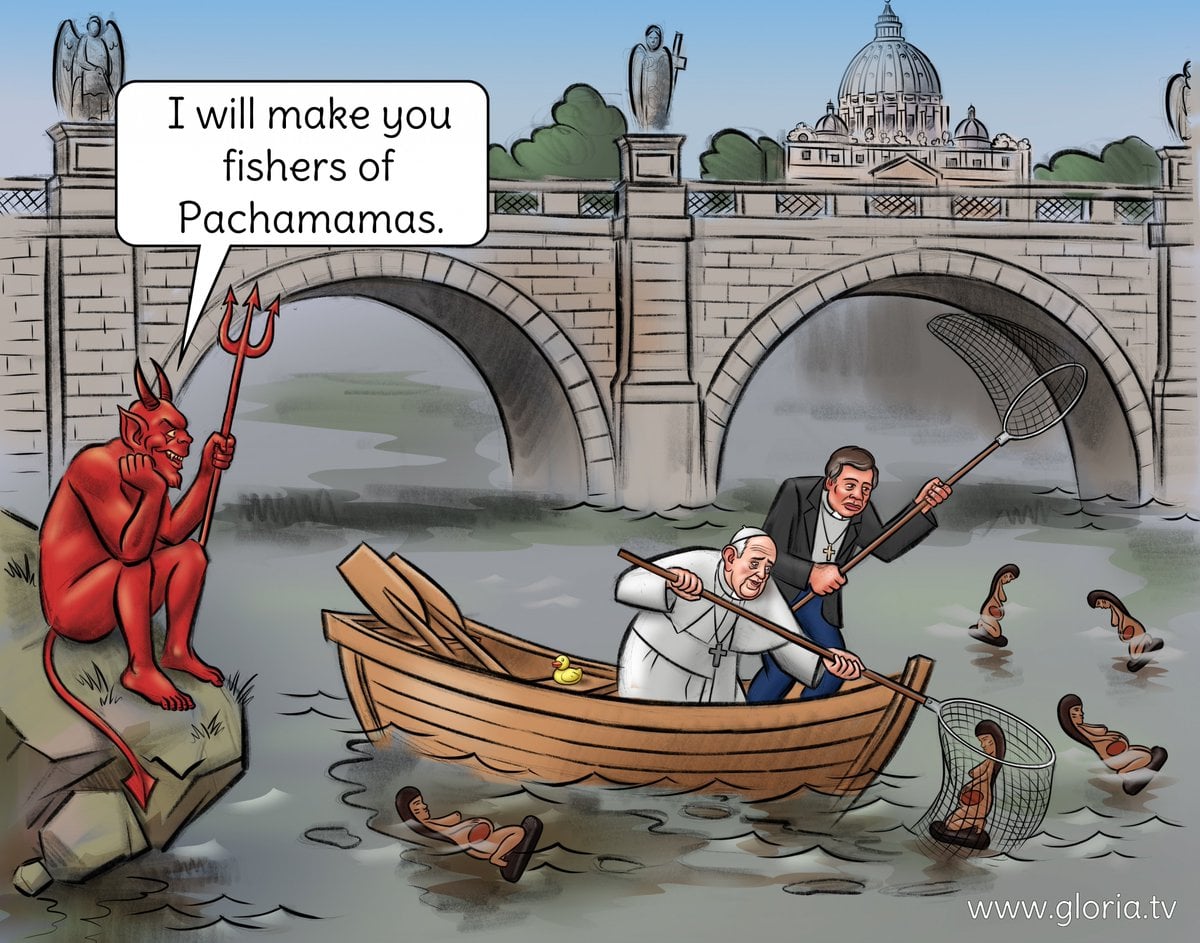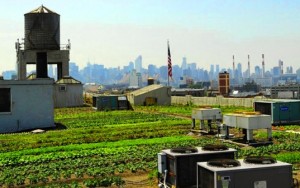Science teaches us at once both the immense vastness of the universe at a macroscopic level — galaxies whose expanse in space generates awe in even the most cynical — as well as the inverse: the billions of cells that make up each individual organism. Together they reveal the vast web of interconnectedness, the foundation of God’s design for a world whose destiny is a living communion held together in love. Each human being, uniquely and through his or her own gifts, becomes part of the story of how this mystery is revealing itself over the steady flow of history. (NS)
Tag: faith and ecology
Pachamama: idolatry breeds sacrilege
THE IDOLATRY AND SACRILEGE AT THE RECENT SYNOD ON THE AMAZON
I wish to speak to you about recent events in Rome, in connection with the synod—the meeting of bishops—regarding the Amazon region. This synod was summoned in order to address the challenges faced by the Church in the Amazon region, especially those that are connected with the evangelization of the indigenous peoples there. During the synod, images of Pachamama, the earth goddess of the Incas, was displayed and honoured in the Vatican gardens, carried into St. Peter’s Basilica in a canoe, and also displayed in the Church of Santa Maria in Transpontina, next to St. Peter’s. During the ceremony in the Vatican gardens, some (including at least one who was apparently a Franciscan friar) prostrated themselves before the image of the pagan goddess.
These actions so outraged many of the Catholic faithful that, a few days ago, some faithful Catholic young men went into the Church of Santa Maria in Transpontina, collected the images of Pachamama, and threw them into the Tiber river. This action was greeted with rejoicing by many Catholics.
The courageous Bishop Athanasius Schneider from Kazakhstan summed up those events in this way in an open letter:
1. “You shall have no other gods before Me,” says the Lord God, as the first of the commandments (Ex 20:3). Delivered originally to Moses and the Hebrew people, this command remains valid for all people and all times, as God tells us: “You shall not carve idols for yourselves in the shape of anything in the sky above or on the earth below or in the waters beneath the earth; you shall not bow down before them or worship them” (Ex 20:4-5). Our Lord Jesus Christ kept this commandment perfectly. When offered the kingdoms of the world if only he would bow to the devil, Jesus responded, “Begone, Satan! for it is written, ‘You shall worship the Lord your God and him only shall you serve’” (Mt 4:10; Dt 6:13-14). The example of Christ therefore is of the utmost importance for all people who desire “the true God and eternal life”; as St. John the Apostle exhorts us: “Little children, keep yourselves from idols” (1 Jn 5:20-21)…
2. On October 4, 2019, on the eve of the Amazon Synod, a religious ceremony was held in the Vatican gardens, in the presence of Pope Francis and of several bishops and cardinals, which was led partly by shamans and in which symbolic objects were used; namely, a wooden sculpture of an unclothed pregnant woman. These representations are known and belong to indigenous rituals of Amazonian tribes, and specifically to the worship of the so-called Mother Earth, the Pachamama. In the following days the wooden naked female figures were also venerated in St. Peter’s Basilica in front of the Tomb of St. Peter. Pope Francis also greeted two bishops carrying the Pachamama object on their shoulders processing it into the Synod Hall where it was set in a place of honor. Pachamama statues were also put on display in the church of Santa Maria in Traspontina.
Objective sources note that the Pachamama is an object of veneration, a goddess to which some Bolivians sacrifice llamas, an earth deity worshipped by some Peruvians, rooted in pagan Incan beliefs and practices.
3. Catholics cannot accept any pagan worship, nor any syncretism [mixing of religions] between pagan beliefs and practices and those of the Catholic Church. The acts of worship of kindling a light, of bowing, of prostrating or profoundly bowing to the ground and dancing before an unclothed female statue, which represents neither Our Lady nor a canonized saint of the Church, violates the first Commandments of God: “You shall have no other gods before Me” and the explicit prohibition of God, who commands: “Beware lest you lift up your eyes to heaven, and when you see the sun and the moon and the stars, all the host of heaven, you be drawn away and worship them and serve them, things which the Lord your God has allotted to all the peoples under the whole heaven” (Dt 4:19), and: “You shall make for yourselves no idols nor graven image, neither rear you up a standing image, neither shall you set up any image of stone in your land, to bow down unto it: for I am the Lord your God” (Lev 26:1).
The Apostles prohibited even the slightest allusions or ambiguity in regard to acts of venerating idols: “And what agreement has the temple of God with idols?” (2 Cor, 6:15-16), and “Flee from idolatry. The things which the Gentiles sacrifice, they sacrifice to devils, and not to God: and I would not that you should have fellowship with devils. You cannot drink the cup of the Lord, and the cup of devils: you cannot be partakers of the Lord’s table, and of the table of devils. Do we provoke the Lord to jealousy? Are we stronger than he?” (1 Cor 10:16, 21-22).
St. Paul, without doubt, would say to all who actively participated in the acts of veneration of Pachamama statues, which symbolize material or creatural things, these words: “But now, after that you have known God, or rather are known by God: how turn you again to the weak and needy elements, which you desire to serve again?” (Gal 4:9). The pagans, indeed, worshipped the elements as though they were living things. And observing the syncretistic or at least highly ambiguous religious acts in the Vatican’s Garden, in St. Peter’s Basilica and in the church of Santa Maria in Traspontina, St. Paul would say: “They worshipped and served the creature rather than the Creator, who is blessed forever” (Rom 1:25)…
As established by the Second Council of Nicaea, the Church permits the veneration with exterior gestures of worship such as bowing, kissing and blessing, no other symbols, pictures, or statues but “the icons of our Lord God and Savior Jesus Christ, that of our Lady the Theotokos [Mother of God], those of the venerable angels and those of all saintly people. Whenever these representations are contemplated, they will cause those who look at them to commemorate and love their prototype.”
Now it is said that those who bowed down to image of Pachamama were not literally worshiping the wooden statue but rather what it symbolizes—that is, Mother Earth. Well, that is just as unacceptable to us. The earth is God’s creation, but it is not divine. This notion that all is God and God is all is called pantheism. It is incompatible with Christian faith.
In a way, the gods and goddesses of ancient pagan mythology grew out of nature pantheism. The gods and goddesses are just personified aspects of the natural world; or else, the pagan gods are a divinization of the tribe or nation or empire. The reason for the prohibition of idols in the First Commandment is that idolatry confuses God with his created world. To confuse human beings with God’s own nature is the deception that the serpent—Satan himself—insinuated to Eve in the Garden of Eden, when he said, “you will be like God, knowing good and evil” (Gn 3.5).
At the synod, many expressed concern about responsible human stewardship of the natural world. So far, so good: after all, the Lord did tell Adam and Eve to tend the garden, not to abuse it (Gn 1.26). However, the earth is not divine, and we must not worship Mother Nature. To worship the earth or nature is to commit idolatry and is forbidden by the First Commandment.
There are many problems in the Amazon region: ecological damage, conflicts involving the indigenous peoples and business interests and the state, violations of human and political rights. Those require attention; and sometimes the well-being of the indigenous people has been neglected. However, the greatest need of the Amazonion peoples—as of all of us, of all human beings—is to hear and to believe the Gospel of Christ, to be baptized, and to live as his disciples. It is cruelty and injustice to leave the indigenous peoples in the darkness of paganism. If the Apostles had been content for our ancestors to worship the gods and goddesses of nature or of the tribe or the empire, none of us would be Christian today.
If you go back far enough in history, our ancestors were pagans and worshiped the sun and the moon and the stars and Mother Earth. When they became Christians, they were baptized and renounced all of that as the worship of Satan. It is God’s will that the indigenous people of the Amazon, like our own ancestors (wherever they came from and however long ago they were converted), do the same and come to worship only the living God—the Father, Son, and Holy Spirit.
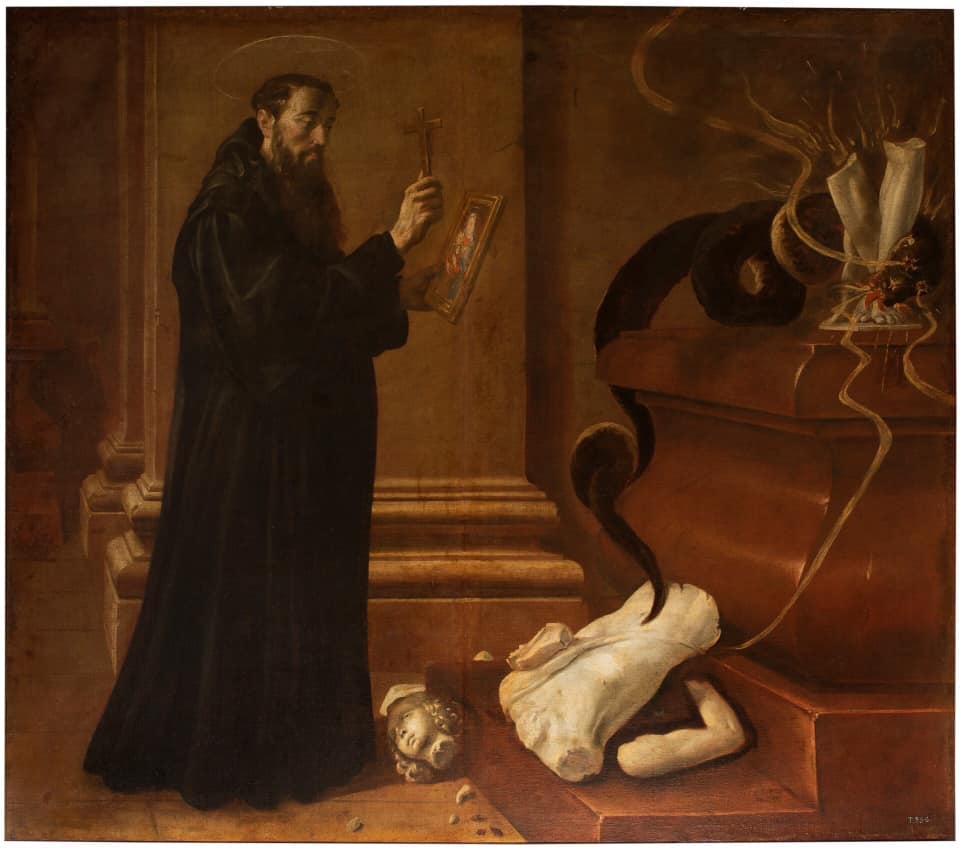 St. Patrick overthrew the idols in Ireland; St. Augustine of Canterbury did the same in Engalnd, when he came to convert the Anglo-Saxons. St. Boniface, when he evangelized Germany, chopped down the sacred oak of the god Thor and used its wood to build a cross and a church. When St. Benedict, the Father of Monks, founded his monastery at Monte Cassino, he destroyed the shrine of Apollo and the sacred grove of Venus and built shrines to St. John the Baptist and St. Martin of Tours.
St. Patrick overthrew the idols in Ireland; St. Augustine of Canterbury did the same in Engalnd, when he came to convert the Anglo-Saxons. St. Boniface, when he evangelized Germany, chopped down the sacred oak of the god Thor and used its wood to build a cross and a church. When St. Benedict, the Father of Monks, founded his monastery at Monte Cassino, he destroyed the shrine of Apollo and the sacred grove of Venus and built shrines to St. John the Baptist and St. Martin of Tours.
Many people forget that the pagan religions were often filled with fear and superstition and sometimes with terrible practices, such as human sacrifice and infanticide and tribal warfare. That is how it was in large parts of the New World when the Spanish and Portuguese and French missionaries came.
Think of Mexico. The Aztecs thought that if they did not feed their gods with human blood, the whole cosmos would die and would be plunged into darkness and chaos. In addition, the Aztec empire demanded a huge tribute in slaves and warriors from conquered tribes so that these could be offered in sacrifice on the altars: the mythology was also the legitimation of the subjugation of conquered tribes to the Aztec emperor. The Catholic Christian conversion of the indigenous people ended all that, through the intercession of Mary, as Our Lady of Guadalupe. The demonic dominion of the Aztec gods has come to an end in the triumph of Christ and of his Mother; and this is not the defeat of the Mexican Indians but rather their triumph and new life in the Body of Christ.
That is the gift that we must preserve and hand on to the Amazonian indigenous people and to all of mankind: to bring them into the Kingdom of Christ. If the Pope or the cardinals or the bishops or the priests or the theologians have done wrong, then it is charity to say so and to pray for them the mercy of God, that they may see their error and repent of it. Let us do that today.
Bishop Schneider has composed the following Prayer of Reparation for the sacrilege and idolatry at the Amazon Synod. I ask you to pray it with me.
Most Holy Trinity, Father, Son and Holy Spirit, receive through the hands of the Immaculate Mother of God and Ever Virgin Mary from our contrite heart a sincere act of reparation for the acts of worship of wooden idols and symbols, which occurred in Rome, the Eternal City and the heart of the Catholic world, during the Synod for the Amazon. Pour out in the heart of Our Holy Father Pope Francis, of the Cardinals, of the Bishops, of the priests and lay faithful, your Spirit, who will expel the darkness of their minds, so that they might recognize the impiety of such acts, which offended your Divine majesty and offer to you public and private acts of reparation.
Pour out in all members of the Church the light of the fulness and beauty of the Catholic Faith. Enkindle in them the burning zeal of bringing the salvation of Jesus Christ, true God and true man, to all men, especially to the people in the Amazon region, who still are enslaved in the service of feeble material and perishable things, as they are the deaf and mute symbols and idols of “mother earth”, to all people and especially to the people of the Amazonian tribes, who do not have the liberty of the children of God, and who do not have the unspeakable happiness to know Jesus Christ and to have in Him part in the life of your Divine nature.
Most Holy Trinity, Father, Son and Holy Spirit, you the one true God, besides Whom there is no other god and no salvation, have mercy on your Church. Look especially upon the tears and the contrite and humble sighs of the little ones in the Church, look upon the tears and prayers of the little children, of the adolescents, of young men and young women, of the fathers and mothers of family and also of the true Christian heroes, who in their zeal for your glory and in their love for Mother Church threw in the water the symbols of abomination which defiled her. Have mercy on us: spare us, O Lord, parce Domine, parce Domine! Have mercy on us: Kyrie eleison!
[This homily was recently preached by dear friend and faithful Benedictine monk.]
Rogation Days 2019
Rogation Days 2019 are coming… May 27-29.
If you have a farm or extensive vegetable garden, then ask your priest to come and pray the rogation prayers.
Read:
Restoring the Earth – Apostolic Farming
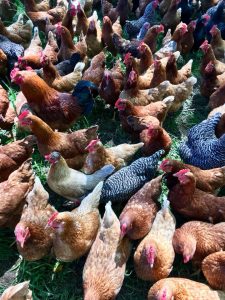 One of my loves is agriculture. Not many would have guessed it. This love has its roots in several places: family, church and the love of food and good health. Catholics and Orthodox Christians have a very long interest in being good stewards of land and water, animals, fish, fowl and agriculture. How we treat these things indicates how we think about ourselves. Neglect and abuse of the land ends badly for everybody. One of the things that I have keenly learned is that too many of have become so disconnected from the land and unconcerned with the quality of our food, the dignity of hard work and the recognition of what we have is given to us as a gift from God.
One of my loves is agriculture. Not many would have guessed it. This love has its roots in several places: family, church and the love of food and good health. Catholics and Orthodox Christians have a very long interest in being good stewards of land and water, animals, fish, fowl and agriculture. How we treat these things indicates how we think about ourselves. Neglect and abuse of the land ends badly for everybody. One of the things that I have keenly learned is that too many of have become so disconnected from the land and unconcerned with the quality of our food, the dignity of hard work and the recognition of what we have is given to us as a gift from God.
Benedict XVI reminded us in Caritas in Veritate:
It is necessary, then, to point in a truly unified way to a new balance between agriculture, industry and services, so that development be sustainable, and no one go without bread and work, and so that air and water and the other primary resources be preserved as universal goods (No. 27).
We need to look at some thinking and experience of farming that only begins to put some things together to as to understand work of faith and ecology. Let me propose “Restoring the Earth” some guiding ideas from Madonna House. We can also call it what Catherine Doherty called, Apostolic Farming.
Just as Pope John Paul gave us a superb theology of the body, we now need to connect that theology with a renewed and robust theology of creation. Many forget that we actually have a theology of creation! This proposal is one that needs to be echoed loudly that shows that farms and farmers incarnate in a particular way God in the world. And because of this fact, we need to be good stewards of the land because God gave us the land and natural resources. Farmers have a vocation that really mirrors the Order of Deacon: a way to serve and feed others.
Gardening is good for you
Indeed, working in the soil is a good you on many levels, not least on the spiritual and affective levels. We know getting out in the fresh air and working is good exercise. Experience tells me that our whole disposition changes for the better. There is a story that when a certain Dominican nun who was having a difficult day with the novices, she would go to the garden in her monastery. Sr. Columba also encouraged the novices to do the same.
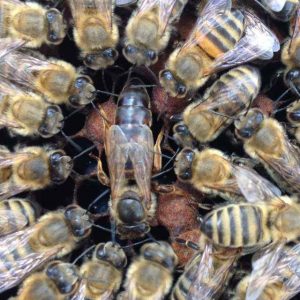 This past week I’ve been settling my commitment to my small agriculture for 2018 with the ordering of some new bee hives, placing an order for new honey bee colonies. This year, I am getting a new species of honey bee from Canada called Saskatraz. This past year I year I had some sort of Russian-mix bee. But I had some issues with the colonies and it’s very possible that only one of three colonies survived.
This past week I’ve been settling my commitment to my small agriculture for 2018 with the ordering of some new bee hives, placing an order for new honey bee colonies. This year, I am getting a new species of honey bee from Canada called Saskatraz. This past year I year I had some sort of Russian-mix bee. But I had some issues with the colonies and it’s very possible that only one of three colonies survived.
I have adopted the motto: save the honey, save the church. You could also replace “church” with “culture” or “the family.”
Committing oneself to the honey bee is a commitment to a 100 million year history of life. The honey bee is one of the most amazing insects God has given us! You can’t underestimate the importance of the honey bee in human and animal life. And yet, we humans are not too aware of our actions that obstruct or even kill the bee due to shallow desires like the eradication of dandelions and white clover. Nevertheless, I am doing my part. I daily pray for my honey bees and I have developed an affection for them.
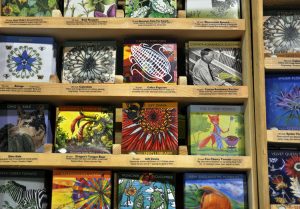 Likewise, I am beginning to organize my mind on what may be planted. With all the seed catalogs I’ve received there is no shortage of ideas; there is a shortage in space and energy to do the work.
Likewise, I am beginning to organize my mind on what may be planted. With all the seed catalogs I’ve received there is no shortage of ideas; there is a shortage in space and energy to do the work.
Back in November 2017 I planted approximately 15 pounds of garlic in the various gardens I oversee.
As a side note, I ran across a CNN article on the papal garden. Now while the Pope says he’s committed to good ecology and the connection with Faith, he doesn’t personally plant and tend the garden on his 62 acre farm. A shame. But the Roman Pontiffs of recent years have had some sort of garden at the summer residence, Castel Gandolfo, just outside of Rome feeding the pope and his guests. Yet, there is a good example set by Pope Francis in is his desire for fresh food. Apparently, he gets a daily basket of fresh produce which may include seasonal items like broccoli and cauliflower but he also gets handmade cheeses, milk, eggs and yogurt are also made fresh each day.
The papal farm has seven farmers and several nuns who make high-quality olive oil cold-pressed by granite stone from a 1000 olive trees (some dating back to AD 1200), 30 cows, and chickens for nutrient dense eggs and meat. Here’s a brief video.
Lots of work to be done in the next 69 days.
What is meant by “sustainability” by Christians?
We are snowed-in today. The weather is treacherous with the snow and wind outside that I have been able to think about some other things today. Snow days are good for the soul. The recent years have found me thinking more and more about the reasonableness of faith and ecology. The leadership and advocacy for the proper use of the land, air and sea by Patriarch Bartholomew (Constantinople), Pope Benedict XVI and now Pope Francis have raised some good questions about the coherent Christian response to the needs of our environment. These religious leaders have provided good thinking and ways of proceeding without dipping into the reigning ideologies of the political left. For example, Benedict raised the horizons and limitations between human and environmental ecologies. Fast forward, across my computer screen came a very brief note about sustainability by Abbot Tryphon, an abbot in the Orthodox Church living in the Pacific Northwest. For me, the abbot’s words are the beginning of a much larger conversation I am having about the Christian fact of being anointed priest, prophet and king in the Church at baptism, and with Benedictines (monks, nuns and laity) viz. matters of land use, farming, food, as a manner of knowing the Trinity, faith, oneself, and the journey of the self as imago Dei. Benedictines have much to say because their 1500-plus year experiences in these matters of faith and ecology. How do we engage with the land as disciples of Christ in relationship with others?
Abbot Tryphon….
We are, in essence, called to be priests over creation. Sustainability is the current ‘buzzword’ regarding the need for protecting our environment, and is the word being used by environmentalists, governments, businesses, and many average people, as we all face the challenge of saving our world from climate changes, due to the overproduction depletion of the world’s resources. It has been applied to product sourcing, agricultural practices, and technology. It often implies a type of energy that will not—in the foreseeable future—be used up, as some scientists argued was imminent in the case of fossil fuels. It may mean a type of agriculture that doesn’t tax our soil as is being done at the current and alarming rate. The word sustainability is even being applied to waste treatment and water use. These are only a few of the applications that have made use of the phrase ‘sustainable,’ and even in these noted fields the technologies and practices developed have been amazing and immensely beneficial for our culture, humanity in general, and the natural world.
The use of the word “sustainability” is, for us Orthodox Christians, a positive word in relation to our responsibilities as stewards of all that God has given us. It is also a word that people can relate to. Yet despite the laudable achievements within the sustainability movement, there is a dark underside to the usage of the word and the application of the concept. “Sustainable” often means trying to find a “better” way to continue living as we currently do, and often bears within itself an underlying notion of stasis, or remaining the same. For Orthodox Christians, this is unquestionably dangerous.
Imagine a priest upon his deathbed speaking with his confessor about his parish, saying, “Yes, I leave them exactly as I found them; they don’t regularly commit any more sins than when I got to the parish.” Contrast this possibility with, “By the grace of God, they have grown.” All priests are charged with the responsibility of helping their parishioners grow, for there is in fact no such thing in the spiritual life as stasis. If someone is not growing, struggling, and working out his or her salvation, the seeds of degeneration are already planted.
But if we are not ordained priests, we might wonder how this could have anything to do with us. Yet as Orthodox Christians living in the God-created world, we are all, in the deepest sense, priests over creation. His All-Holiness, the Ecumenical Patriarch Bartholomew, said: “Endowed… from the beginning with ‘the image of God,’ humanity is called to continuous self-transcendence so that, in responsible synergy with God the Creator, each person might sanctify the entire world, thus becoming a faithful ‘minister’ and ‘steward.’” We are, in essence, called to be priests over creation, for as ministers of this created universe it is our responsibility to cease doing harm, for our final goal is the transfiguration of creation. The ultimate transformation that must take place within ourselves ultimately brings transformation to the entire cosmos.
The earth is God’s gift to all of us
Earth Day bears us to recall what Pope Benedict XVI said:
“On this earth there is room for everyone: here the entire human family must find the resources to live with dignity, through the help of nature itself — God’s gift to his children — and through hard work and creativity. At the same time we must recognize our grave duty to hand the earth on to future generations in such a condition that they too can worthily inhabit it and continue to cultivate it… One of the greatest challenges facing the economy is to achieve the most efficient use — not abuse — of natural resources.”
(Caritas in Veritate, 50)
Farming, faith and eating well: initiatives
Interest in growing fresh vegetables and farming is real life these days in many urban settings.There is significant concern for wellness issues like where is our food coming from and how is it raised. The impact of bad practices and careless behavior is taking a toll on people in a multiplicity of ways: poverty, hunger, cancer, mental illness, human sustainability, and the like.
City farming is the subject of this video report by Monocle. It provides some very interesting things to think about like, space, soil, nutrients, people, being co-creators, etc. The three reports given in the Monocle video look at innovative work in Japan, NYC and Norway. Watch the report. In the New Haven area there are some community gardens sprouting up, for example, Yale University has a community garden the Yale Farm (Edwards Street) and then there are lots of modest initiatives. Plus, the growing of farmers’ markets.
I have a modest garden with edibles and decoratives. But I can’t sustain a family on what I grow. I have learned to make pickles from homegrown cucumbers, and I will can tomatoes, but if I had other favorable factors I could do more. My grandparents would be proud since that’s how they managed to live. What I have concluded is that life is much better with homegrown produce than what is purchased in big stores like Walmart and Big Y. Well, that’s for the spring and summer. Come the autumn and winter we have to go back to the store.
But this matter is a part of a larger question of faith and ecology. The biblical and sacramental life of the Church have something to say to us today. In my mind, Christians have to reclaim what it means to live well with with what God has given through a sacramental lens. For this reason, I am thinking more and more about the role the Benedictines can play in the development of a faith and ecology project. The Benedictine charism is one in which simplicity, faith, work, study, mutual obedience, concern for the other and co-creation with God are high values. Plus, the monastic life with its emphasis on moderation lived in communion with others is key. I would also include the ecclesial movements of Communion & Liberation and Focolare as key infrastructures of grace and holiness. With a few spare moments here-and-there I am trying to think about a Christian’s response to the matter of food, wellness, farming, and the like. People like Ken Myers (Mars Hill Audio Journal), Norman Wirzba (Duke Divinity School), Fred Bahnson (Wake Forest Divinity School) and Wendell Berry (public intellectual) along with Pope Benedict XVI are setting the stage for new things.
The Primacy of the Human, develop a human ecology, Pope reminds
The primacy of the human is based on our belief in the transcendent. All aspects of the human person –politics, philosophy, ethics, economics and medicine– are rooted in the respect of and in engagement with the Divine. Catholics will further develop this idea of the transcendent by reflecting on the Trinity of the Godhead, God the Father, God the Son, and God the Holy Spirit. A personal God who lives and is active in history. The pope addressed the new ambassadors of Moldova, Equatorial Guinea, Belize, Syria, Ghana and New Zealand on 9 June when they presented their diplomatic credentials to the Holy See. Ordinarily, one doesn’t pay lots of attention to papal discourses made to the diplomats but it seems that there is some serious thinking going on here with the Pope viz. this sector of his ministry.
Continue reading The Primacy of the Human, develop a human ecology, Pope reminds

